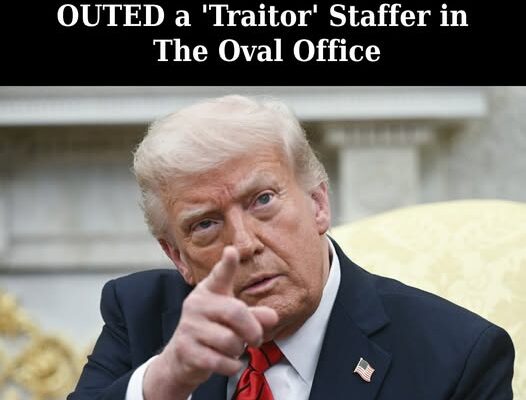In an unprecedented move underscoring the deepening divisions between President Donald Trump and several high‑profile government officials, Trump issued executive orders on Wednesday that revoked the security clearances of two former high‑ranking officials: Chris Krebs, the former Director of the Cybersecurity and Infrastructure Security Agency (CISA), and Miles Taylor, a former Department of Homeland Security (DHS) official. These dramatic actions—accompanied by directives to investigate their conduct during Trump’s first term—have sent shockwaves through political and government circles.
At the heart of the controversy is a broader debate about the limits of free speech in government, the integrity of federal processes, and the politicization of national security. In his series of executive orders, Trump accused Krebs of “weaponizing” his position against free speech in the context of the 2020 presidential election and described Taylor as someone who publicly led “the resistance” during his term. As part of a detailed Presidential Memorandum, Trump directed all federal agencies to immediately revoke any active security clearance held by Krebs and to suspend clearances for individuals and entities associated with him. The memorandum also mandates that the Department of Justice (DOJ), along with other federal bodies, investigate what Trump termed “malign acts” carried out by Krebs while he served as CISA director.
This article will explore the timeline and key components of these actions, provide context on the history of the individuals involved, examine responses from federal officials and legal experts, and consider the broader implications for government transparency and accountability in national security matters.
A. Chris Krebs – Former CISA Director
Chris Krebs was the first director of the Cybersecurity and Infrastructure Security Agency (CISA), an agency within the Department of Homeland Security charged with protecting the nation’s critical infrastructure from cyber threats and other emergencies. During his tenure, Krebs became a prominent voice on the 2020 presidential election, strongly asserting that the election was “the most secure in American history.” His public stance, however, put him at odds with President Trump after the 2020 election, who dismissed the claims of security and instead repeatedly promoted allegations of widespread electoral fraud.
Krebs’s candid remarks, which contradicted the president’s rhetoric, led Trump to publicly fire him in the aftermath of the election—a move Trump later justified by describing Krebs as a “fraud” and a “disgrace.” Now, in an effort to discredit his detractors and reassert his authority over national security messaging, Trump has taken further action by revoking Krebs’s security clearances and ordering a fresh investigation into his past conduct while leading CISA.
B. Miles Taylor – Former DHS Official
Miles Taylor is another high-profile figure in Trump’s post‑election narrative. Once a senior official at the Department of Homeland Security, Taylor became widely known after writing an anonymous op‑ed in 2018, which was later revealed to be authored by him. In the op‑ed, Taylor criticized what he saw as internal efforts to undermine the Trump administration’s agenda, claiming that elements within the government were working against the president from inside.
After leaving government service, Taylor transitioned into the media spotlight as a political analyst for CNN, and his outspoken positions have since made him a target of criticism from the Trump camp. Trump’s recent executive order specifically directs that any active security clearances held by Taylor—or by those associated with him, including individuals at institutions such as the University of Pennsylvania, where he is a lecturer—be reviewed and potentially revoked if deemed inconsistent with national interests. This move is designed to signal that the Trump administration will no longer tolerate dissent or actions it views as undermining its policy directives.
III. The Presidential Memorandum: Revoking Security Clearances and Ordering Investigations
A. Details of the Memorandum
On Wednesday, President Trump signed a series of executive orders and directives from the Oval Office that have now become a defining moment in his post‑election policies regarding internal dissent and national security clearances. The key points of the Presidential Memorandum include:
-
-
Revocation of Clearances:
The memorandum specifically directs the heads of federal agencies to immediately revoke any active security clearance held by Chris Krebs. In addition, clearances held by individuals and entities associated with Krebs, including those at organizations like SentinelOne, are to be suspended pending a review of whether their continued access is consistent with the national interest. -
Investigation Mandates:
The order instructs the Department of Justice (DOJ) and other relevant federal entities to probe what Trump describes as “malign acts” conducted by Krebs during his tenure as the head of CISA. The focus of the investigation is on Krebs’s handling of issues related to free speech and his response to the 2020 election anomalies. -
Actions Against Miles Taylor:
Similarly, the memorandum touches on Taylor’s status by directing the review of security clearances granted to individuals at institutions linked to him, particularly the University of Pennsylvania. The language used by the administration suggests that Taylor’s past involvement in championing the “resistance” during Trump’s first term is now under scrutiny, and any clearances associated with him are subject to review.
-
B. Rationale Behind the Measures
White House staff secretary Will Scharf explained in an official statement that the memorandum is intended to “address his access to existing government clearances” by investigating allegations that Krebs had used his position to suppress free speech in the election context and that similar misconduct occurred under Taylor’s tenure. The president’s remarks are highly charged, with Trump stating that he does not recall personally meeting Krebs but condemning his actions as emblematic of a broader betrayal.
Trump’s rationale for these actions is rooted in his longstanding narrative that his administration was under siege by officials who, in his view, worked against his agenda. By revoking clearances and ordering fresh investigations, Trump seeks to reassert control over the narrative of election security and national integrity.
C. Political Messaging and Public Statements
In his announcement, Trump described the decision as a “critical step toward restoring accountability in the federal government.” He used pointed language, calling Krebs a “fraud” and a “disgrace” for his actions following the election. On his social media platform Truth Social, Trump wrote, “I don’t know that I met him. I’m sure I met him, but I didn’t know him, and he came out right after the election—the election, which was a rigged election, a badly rigged election.” This rhetoric fits into a broader political narrative championed by Trump and his supporters—a narrative that seeks to delegitimize critics and dissenters from within the government.
Trump also promised that, as part of his directive, agencies would not only revoke clearances but that all associated clearances of individuals connected to Krebs or Taylor would be suspended pending review. In doing so, he underlines his commitment to purging elements within the federal bureaucracy that he deems as disloyal or harmful to his vision of America’s future.
IV. Reactions from Within the Federal Government and Political Circles
A. The Response from the Treasury and DOJ
Following the issuance of the memorandum, a Treasury spokesperson confirmed that Commissioner Melanie Krause has led the IRS through “a time of extraordinary change” before stating that the memorandum “addresses his access to existing government clearances.” This language suggests that senior Treasury officials view these actions not simply as punitive measures, but as part of a broader strategy to reform federal processes and ensure that clearances are only held by those whose records align with national security interests.
Additionally, the Department of Justice has been tasked with investigating the alleged “malign acts” of Krebs. According to White House explanations, the DOJ is expected to collaborate closely with other federal entities to scrutinize the actions taken by Krebs during his tenure and to evaluate whether his use of security clearances was appropriate or if it constituted an abuse of power. The memo’s directive aims to send a clear signal that any deviation from the “national interest”—in the eyes of the president—will be met with rigorous inquiry.
B. Comments from White House Officials
Will Scharf, the White House staff secretary, was unequivocal in his comments regarding the memorandum. He noted, “This is another, similar Presidential Memorandum to the one you just signed. It addresses [Krebs’s] access to government clearances he might have, and further instructs your Department of Justice, other aspects of your government, to investigate some of the malign acts that he participated in while he was still head of CISA.” Scharf’s statement emphasizes a dual approach: immediately removing Krebs’s clearance and launching an investigative process that may reveal additional misconduct.
These comments are intended to reassure Trump’s supporters that the administration is taking decisive action against dissenting voices within the federal bureaucracy—an effort to realign the government with Trump’s vision of strict accountability and unwavering loyalty.
C. Reactions from Political Figures and Analysts
Political commentators and lawmakers from both sides of the aisle have weighed in on the decision. Many of Trump’s supporters applaud the move as a necessary measure to protect “free speech” and ensure that dissent is not tolerated among senior officials. They argue that the revocation of clearances is a direct response to what they perceive as a betrayal of the president’s mandate by individuals like Krebs and Taylor.
Conversely, critics have expressed concern that these actions represent an attempt to politicize the security clearance process and undermine the non‑partisan tradition of federal service. They warn that such measures could have a chilling effect on free expression among government officials and might set a dangerous precedent for future administrations. Questions have been raised about the potential legal challenges that could emerge, as privacy advocates and civil liberties groups argue that the memorandum may overstep constitutional boundaries by interfering with an individual’s right to security clearance and due process.



